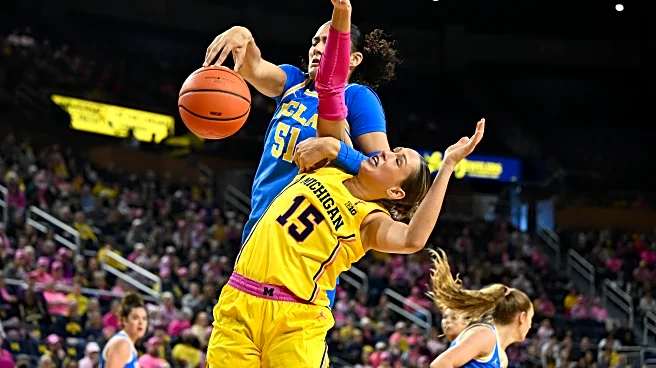What's Happening?
The Southeastern Conference (SEC) has mandated availability reports for conference games, including the upcoming matchup between South Carolina and Texas A&M. This requirement, now in its second year, obliges schools to disclose player availability for games against
conference opponents. South Carolina, with a record of 3-6, will face Texas A&M, ranked No. 3 in the country, at Kyle Field. The initial availability report lists South Carolina players Cason Henry and Jatavius Shivers as out, while Texas A&M has Bryce Anderson, Le'Veon Moss, and Rashad Johnson Jr. out, with Scooby Williams doubtful and Mario Craver questionable. The SEC's policy aims to enhance transparency and integrity in the sport.
Why It's Important?
The SEC's requirement for availability reports is significant as it promotes transparency and fairness in college football. By mandating these reports, the conference seeks to prevent misinformation and ensure that all teams have equal access to player status information, potentially impacting betting and game strategies. This policy could influence how teams prepare for games, as knowing the availability of key players can affect game plans and expectations. The fines for non-compliance, ranging from $25,000 to $100,000, underscore the importance the SEC places on accurate reporting, which could lead to more stringent adherence to the rules.
What's Next?
As the SEC continues to enforce availability reports, schools will need to adapt to the requirements, ensuring timely and accurate updates. The final report must be released 90 minutes before kickoff, which could lead to last-minute strategic adjustments by teams. The ongoing implementation of this policy may prompt other conferences to consider similar measures, potentially leading to a broader shift in college sports transparency. Stakeholders, including coaches, players, and sports analysts, will likely monitor the impact of these reports on game outcomes and betting markets.
Beyond the Headlines
The introduction of availability reports in college football raises ethical considerations regarding player privacy and the potential pressure on athletes to return from injuries prematurely. As transparency increases, the balance between public interest and individual privacy becomes a critical discussion point. Additionally, the policy may influence the culture of college sports, encouraging a more open dialogue about player health and readiness, which could lead to improved safety protocols and support systems for athletes.
















